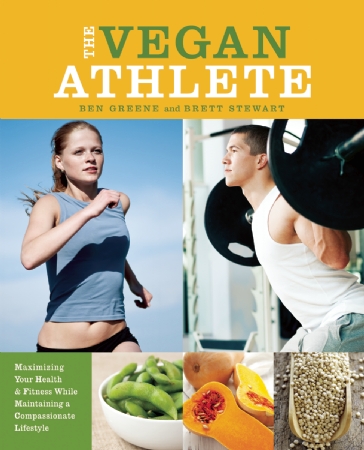The Vegan Athlete Left Us Hungry
The stereotype of the weak, anemic vegan is becoming a thing of the past. As vegan athletes like Scott Jurek and Venus Williams shine a spotlight on the plant-based lifestyle, more people are wondering how becoming a vegetarian or vegan can coexist with (or even enhance) their athletic goals.
With that growing curiosity, writers and publishers have begun to realize the value of this growing market. Brett Stewart, one of the authors of The Vegan Athlete, saw this opportunity and ran with it.
I was excited to hear about this book. I wanted it to be good. I wanted something to add to my arsenal of proof that “plant-based” and “fit” can be used to describe the same person. I wanted this book to be a resource I could recommend to those who wanted to know how they could build strength and endurance without eating meat or dairy. I wanted the combined expertise of Stewart, an established fitness writer, and Ben Greene, a vegan triathlete and fitness coach, to be a powerful one-two punch of information.
And I was let down.
Greene exhibits a great wealth of information on veganism—the five-pages where he answers frequently asked questions about a plant-based lifestyle is as good as anything you can find on the internet. His approach is honest, frank and non-preachy. Stewart provides sound fitness and training tips, replete with photographs to help the reader perform training exercises correctly and without injury.
The problem, however, is that the two concepts seem to exist separately within the book. Information about veganism is presented, as is information about being an athlete; the two do not merge together to talk about being a vegan athlete.
Instead, the book seems to be rather useless for its intended purpose of educating about the subject of its very title: The Vegan Athlete. It’s got good information, but only for a general plant-based lifestyle or general fitness concepts. There’s little mention of their symbiotic relationship.
For example, the book contains a general paragraph on meal timing (“eat every two to three hours”) but nothing specific on eating for workouts—there’s no mention of what to eat before and after exercise, critical periods for nutrition absorption (particularly true for protein, which is best consumed in the 30 minutes after finishing a workout). The “fitness” portion of the book is adequate, but the exercises and photos looked familiar to me. After re-reading the section, I realized it was because the content was largely recycled from Stewart’s other book, 7 Weeks to Getting Ripped.
The appendix, which contains 24 pages of vegan recipes, was the only section that seemed to understand the purpose of the book. Each recipe of this special section, written by endurance athlete and chef Corey Irwin, was prefaced with an explanation of why certain ingredients worked for the vegan athlete. Information on meal timing was wonderful (for example, Irwin suggests eating the Apricot Papaya Pudding Parfait as a post-exercise snack because it has “plenty of antioxidants and electrolytes, a significant amount of carbs to replenish depleted glycogen stores, and protein to help repair muscle caused by exertion during exercise.”).
Ideally, this book would have been written by Greene and Irwin only. To me, it felt like Stewart saw an opportunity to repackage his other book to fit a niche market. Because he isn’t a vegan, he needed someone who did follow the lifestyle in order to give the book some credibility. That’s where Greene came in. But in spite of the “co-author” billing, this book doesn’t seem to be much of a joint effort between the two, and Irwin’s fantastic insights on ingredients and timing comes as an afterthought when it really should be featured within the book.
If I were to loan this book to someone, it would only be for the recipes. There are better resources on the plant-based lifestyle, better resources on fitness, and much better resources on vegan fitness. Brendan Brazier’s Thrive Fitness comes to mind, as do Scott Jurek’s Eat and Run and Robert Cheeke’s Vegan Bodybuilding and Fitness. Even the web provides great sources of information, many of which are free—you can find 50 fantastic ones listed in this post on No Meat Athlete.
But I wouldn’t suggest buying The Vegan Athlete.
What’s your favorite resource on vegan fitness? —Susan

